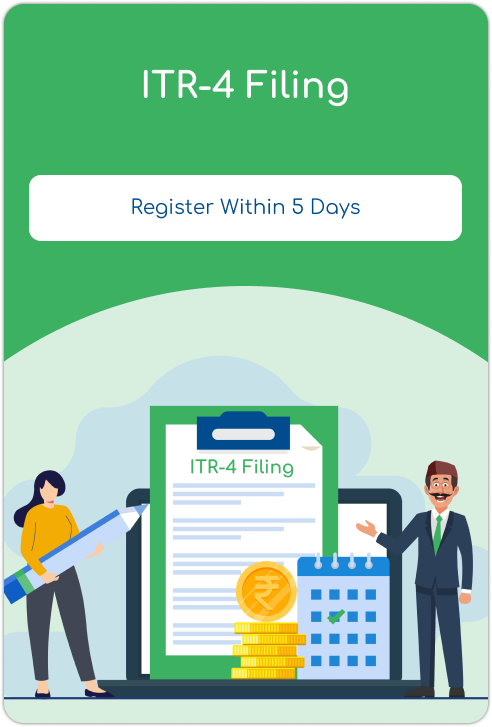
File Your ITR-4
3488 customers
What will you get?
Billing Application
Access of Android
Access of Web Application
Account Writing
Debtors, Creditors monitoring
Income Tax filling
GST Compliances
Financial Planning
Loan Advisory Services
What do we Require?
INR 0 Taxes As Applicable
















Introduction
ITR-4, or Income Tax Return Form 4, serves as the requisite document for individuals and businesses or engage in professions and have opted for the presumptive income scheme under Sections 44AD, 44ADA, or 44AE of the Income Tax Act. This form facilitates the declaration of income at predetermined rates, alleviating the need for maintaining extensive accounting records. Tailored to accommodate income from various sources such as business, profession, house property, salary, and other avenues, ITR-4 offers a streamlined approach to tax compliance. Its online filing process via the Income Tax Department's portal ensures convenience and efficiency for taxpayers. Understanding its nuances, eligibility criteria, and filing obligations is crucial for individuals and Business, Professionals seeking to fulfil their tax responsibilities in accordance with Indian tax laws. Promunim takes pride in providing expert assistance for your ITR 4 filing needs. Our experienced professionals are adept at navigating intricate tax regulations, ensuring precise and punctual submissions. Through our personalized approach, we aim to optimize your tax advantages while mitigating liabilities. Whether you're a freelancer, professional or small business owner, we grasp the intricacies of ITR 4 and pledge to offer thorough support throughout the process. Rely on Promunim to simplify your tax filing journey, allowing you to concentrate on your core business operations.
Eligibility:
- Proprietary Business or Profession:Individuals and Hindu Undivided Families (HUFs) who derive income from a proprietary business or profession are eligible to file ITR 4. This includes income from various sources such as manufacturing, trading, consultancy, freelancing, or any other form of self-employment.
- Presumptive Income Scheme:Taxpayers eligible under the presumptive income scheme as per Section 44AD, Section 44ADA, or Section 44AE of the Income Tax Act can opt to file ITR 4. Section 44AD applies to businesses with a turnover of up to Rs. 2 crores, while Section 44ADA pertains to professionals with gross receipts up to Rs. 50 lakhs. Additionally, Section 44AE applies to taxpayers engaged in the business of plying, hiring, or leasing goods carriages.
- Professionals and Freelancers:Individuals and HUFs engaged in professions such as doctors, lawyers, engineers, architects, interior designers, consultants, and other skilled professionals are eligible to file ITR 4 if they earn income from their profession.
- Small Business Owners:Sole proprietors, individuals operating as co-owners in unincorporated entities, and partners in partnership firms (excluding Limited Liability Partnerships) can file ITR 4 if their income is derived from business activities.
- Income from House Property and Other Sources:Individuals and HUFs with income from a single property or from house property along with other sources, excluding income from lottery winnings and horse race winnings, are eligible to file ITR 4
Documents Requirement:
The documents required for filing ITR 4 vary depending on the nature of your income and financial transactions. However, here's a general list of documents that may be needed:
- Bank Statements:Bank statements for all your bank accounts, including savings, current, and any other accounts held during the financial year, are essential for reconciling income and expenses.
- Profit and Loss Statement:If you're running a business or engaged in a profession, a profit and loss statement summarizing your income and expenses is necessary.
- Balance Sheet:A balance sheet detailing your assets, liabilities, and capital is required if you're running a business or engaged in a profession.
- Receipts and Invoices:Keep copies of all receipts and invoices related to your business or professional activities, including sales invoices, service invoices, and expense receipts.
- Investment Documents:Documents related to investments such as mutual funds, stocks, bonds, fixed deposits, and real estate should be kept handy.
- Property Documents:If you own property, documents such as sale deeds, purchase agreements, and rental agreements are required.
- Loan Statements:If you have taken any loans, maintain records of loan statements, including details of interest paid during the financial year.
- Tax Saving Investment Proofs:Documents supporting tax-saving investments such as receipts for ELSS investments, PPF contributions, NSC purchases, insurance premium payments, etc., are necessary.
- Other Income Proof:Any other sources of income should be supported by relevant documents, such as rental income receipts, interest income certificates, etc.
- GST Returns:If you're registered under GST, GST returns and related documents should be kept ready for reference. Form 26AS: Form 26AS is a statement showing tax credit against your PAN, reflecting TDS deducted on your income. It's essential for cross-verification while filing taxes.
Eligibility criteria for obtaining 80G registration:
- Nature of the Organization:The organization must be registered as a charitable trust, a society, or a section 8 company under the Indian Companies Act, 2013 (formerly Section 25 of the Companies Act, 1956).
- Purpose:The organization's primary purpose must be charitable, religious, educational, or for the advancement of any other object of general public utility. It should not be for the benefit of any particular caste or community.
- No Profit Motive:The institution should not be operated for profit, and its income and assets should only be used for the purpose of promoting its objectives.
- Compliance with Tax Laws:The organization must comply with the provisions of the Income Tax Act, 1961, including maintaining proper books of accounts and filing annual returns.
- Approval from Income Tax Authorities:The organization must apply for and obtain approval from the Income Tax Department under Section 80G of the Income Tax Act, which allows donors to claim deductions on donations made to the organization.
- Not Disqualified:The institution must not be disqualified under Section 80G or any other provisions of the Income Tax Act.
- Documentation:The organization needs to submit relevant documents along with the application, including the registration certificate, memorandum of association, articles of association, audited financial statements, and details of activities undertaken.
Documents required:
- Application Form:The prescribed application form for seeking approval under Section 80G of the Income Tax Act, 1961.
- Registration Certificate:Certificate of registration of the organization as a charitable trust, society, or section 8 company.
- Memorandum of Association (MOA) and Articles of Association (AOA):Copies of the MOA and AOA of the organization, which outline its objectives and rules of operation.
- Financial Statements:Audited financial statements, including the balance sheet, income and expenditure statement, and receipts and payment account for the last three years.
- PAN Card:Copy of the Permanent Account Number (PAN) card of the organization.
- Board Resolution:Resolution passed by the governing body or board of trustees authorizing the application for 80G registration.
- Evidence of Activities:Details of the activities carried out by the organization in furtherance of its objectives, including brochures, pamphlets, project reports, etc.
- Details of Trustees or Governing Body:List of trustees or members of the governing body, along with their contact details and PAN cards.
- FCRA Registration (if applicable):If the organization receives foreign contributions, a copy of the registration certificate under the Foreign Contribution (Regulation) Act, 2010 (FCRA) may be required.
- Proof of Address:Address proof of the registered office of the organization, such as a utility bill or rental agreement.
- Registration under 12A/12AA (if applicable):If the organization is registered under Section 12A or 12AA of the Income Tax Act, copies of the registration certificate may be needed.
- Any other documents as required by the Income Tax Department:Depending on the specific requirements of the Income Tax Department or any additional conditions applicable to the organization, other documents may be requested.

